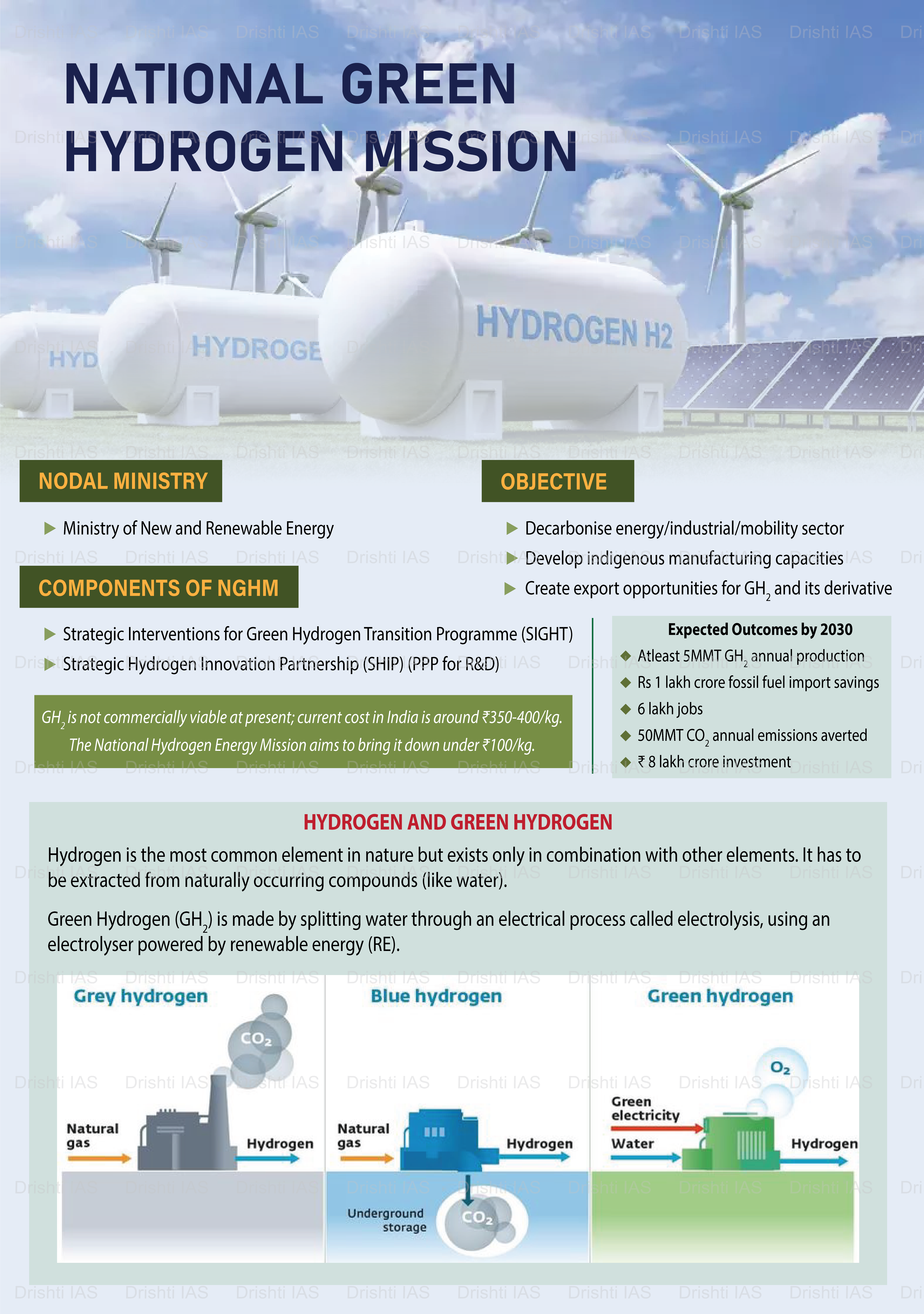Science & Technology
International Conference on Green Hydrogen (ICGH-2023)
- 07 Jul 2023
- 7 min read
For Prelims: Green Hydrogen, Green bonds, Renewable energy, National Green Hydrogen Mission, Net zero Emission Target
For Mains: Staus of Green Hydrogen in India, Challenges Associated with Green Hydrogen.
Why in News?
The three-day International Conference on Green Hydrogen (ICGH-2023) has commenced in New Delhi.
- The conference aims to establish a Green Hydrogen ecosystem and foster a systemic approach to global decarbonisation goals.
What are the Main Themes of the Conference?
- Hydrogen Production Technologies: This theme will focus on various methods of producing green hydrogen such as electrolysis, thermochemical, biological, photocatalysis, etc.
- It will also discuss the challenges and opportunities in scaling up these technologies and reducing their costs.
- Hydrogen Storage and Distribution: This theme will address the issues related to storing and transporting green hydrogen such as compression, liquefaction, metal hydrides, ammonia, etc.
- It will also explore the potential of hydrogen pipelines, refueling stations, etc.
- Hydrogen Applications: This theme will showcase the various applications of green hydrogen in different sectors such as mobility, industry, power generation, etc.
- It will also highlight the benefits and challenges of using green hydrogen as a fuel or feedstock.
- Green Financing: This theme will explore the various sources and mechanisms of financing green hydrogen projects such as green bonds, carbon credits, subsidies, etc.
- It will also discuss the role of public-private partnerships, multilateral agencies, etc. in supporting green hydrogen initiatives.
- Human Resource Development: This theme will focus on the need for developing skilled manpower for the green hydrogen sectors such as engineers, technicians, researchers, entrepreneurs, etc.
- It will also discuss the strategies for upskilling and reskilling the existing workforce and creating awareness among stakeholders.
- Startup Ecosystem: This theme will highlight the role of startups in innovating and disrupting the green hydrogen sector.
- It will also showcase some of the successful startups in this domain and their products or services.
What is Green Hydrogen?
- About:
- Green hydrogen is a form of renewable energy that is produced by splitting water molecules into hydrogen and oxygen using electricity from renewable sources such as solar, wind, hydro or biomass.
- Significance:
- It is the only type of hydrogen that is produced in a climate-neutral manner, making it critical to reach net zero emissions by 2050.
- It has the potential to decarbonize various sectors such as transport, industry, power and buildings, and contribute to the global efforts to mitigate climate change.
- It can also help to balance the intermittency of renewable energy sources, by storing excess electricity and releasing it when needed.
- It can also be converted into other forms of energy carriers such as ammonia, methanol or synthetic fuels, which can be used for various applications.
- Status of Green Hydrogen in India:
- The country has begun setting up 3.5 million tons of green hydrogen manufacturing capacity and aims to produce at least 5 million metric tonnes of green hydrogen per year by 2030.
- India's cost of green hydrogen is expected to be the lowest globally due to the low cost of setting up renewable energy capacity in the country.
- India has made significant progress in advancing green hydrogen technologies and has the National Green Hydrogen Mission in place to promote research, development, and deployment of green hydrogen across various domains.
What are the Major Challenges Associated with Green Hydrogen?
- High Production Costs: Green hydrogen production involves electrolysis of water using renewable energy sources. However, the cost of renewable energy infrastructure and electrolyzers remains relatively high, making green hydrogen production costlier compared to fossil fuel-based alternatives.
- Limited Renewable Energy Capacity: The intermittent nature of solar and wind power requires substantial investments in energy storage infrastructure to ensure uninterrupted power supply for electrolysis.
- Infrastructure Constraints: Building a robust hydrogen infrastructure in India is a critical challenge because the existing infrastructure and supply chain for conventional hydrogen are not sufficient or compatible for green hydrogen.
- Water Availability: Green hydrogen production requires a significant amount of water for the electrolysis process. In regions with limited water resources or facing water scarcity, ensuring sustainable water supply for large-scale green hydrogen production can be challenging.
Way Forward
- Prioritising R&D: There is a need to prioritize research and development efforts to drive innovation in green hydrogen production, storage, and utilization technologies.
- Policy and Regulatory Support: Clear guidelines, subsidies, and tax breaks can encourage companies to invest in this sector and create a favorable market environment.
- Infrastructure Development: India needs to build hydrogen refueling stations, pipelines, and storage facilities to enable the widespread adoption of green hydrogen across different sectors.
- Attracting Private Investment: There is a need to launch large-scale demonstration projects that showcase the feasibility and benefits of green hydrogen across various sectors.
- These projects can attract private sector investments and serve as models for future initiatives.
UPSC Civil Services Examination Previous Year Question (PYQ)
Q. Hydrogen fuel cell vehicles produce one of the following as “exhaust” (2010)
(a) NH3
(b) CH4
(c) H2O
(d) H2O2
Ans: (c)





